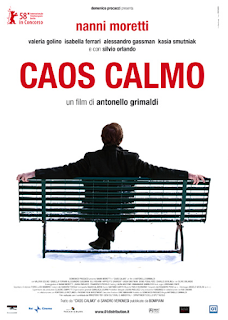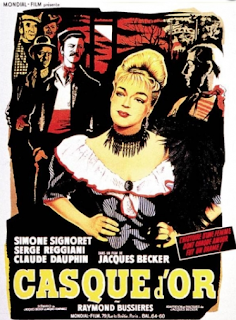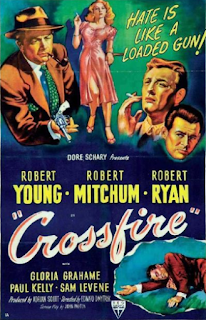Quiet Chaos (2008)
The raunchy sex scene between Nanni Moretti and Isabella Ferrari has been both a blessing and a curse for Quiet Chaos: a blessing because it sparkled the audience's interest and made the film quite successful at the box office, a curse because most of the discussion around the film ended up focusing on that single scene. But Antonello Grimaldi's film is much more than that - it's an original, delicate and subtle reflection on grief and healing, buoyed by an almost uniformly great ensemble.
Pietro Paladini (Nanni Moretti), the manager of an important network, is at the beach with his brother Carlo (Alessandro Gassmann), a fashion designer. They see two drowning women screaming for help and they come to their rescue. Upon returning home, Pietro realizes that his wife has died unexpectedly. Instead of falling into despair, he finds himself in a sort of "quiet chaos": unsure of what to do with his life, he stops showing up at work and decides to wait all day every day sitting on a bench in the park outside of his daughter's (Blu Yoshimi) school. That's the whole movie: Pietro sitting on a bench. Grimaldi's greatest triumph is the fact that he manages to make it extremely compelling despite its static premise and slow pace: in terms of the aesthetic, the always-searching, attentive camerawork spares the movie from having a stage-like vibe; in terms of story and poignancy, the screenplay (an adaptation from Sandro Veronesi's book with the same name) explores with intimacy the relations between Pietro and the various characters with whom he interacts throughout the film, such as his brother, his troubled sister-in-law (Valeria Golino), supportive parents and teachers from the school, colleagues from work (Silvio Orlando, Hyppolite Girardot), a charming young woman who walks her dog every morning (Kasia Smutniak) and the woman he saved (Isabella Ferrari). The plot itself is not especially consistent and there are certain points that feel a little underdeveloped. For example, there's a moment in which the movie raises some questions about Pietro's late wife, even suggesting a potential infidelity, but the subplot is quickly dismissed and forgotten. The arc of Golino's character is also left unresolved and her whole sidestory ends up adding very little to the film. But in spite of this adequacies, the movie thrives at finding the nuances of each character and the impact that they have on Pietro's journey. What is especially remarkable and surprising is the film's unwillingness to veer into melodrama: there are no huge confrontations or bitter screaming matches. It's a movie that strives to be true to life and therefore it doesn't stress the idea of pain itself, but the idea of how to live with pain.
Being such a character-driven film, the acting is key to its success and thankfully most of the cast is up to the challenge. Moretti gives a stoic, minimalistic performance, quietly but powerfully bringing to life his character's journey as he learns how to live again. He manages not to be overshadowed by the flashier performances around him and earns perfectly his few more emotional moments, such as his breakdown in the car that is as cathartic for the character as it is for the audience. Gassmann is great as the brother bringing charisma, enthusiasm and genuine warmth to the part: most importantly, he shares an excellent chemistry with Moretti and the two actors make the scenes between the brothers the heart of the movie. The supporting cast mostly excels: Orlando, Girardot, Yoshimi and Smutniak all acquit themselves very nicely to their roles, but a special menton goes to Ferrari who does wonders with her limited screen-time. She's incredibly moving at portraying her character's trauma and her quiet strength as she tries to move on: her brief meeting with Moretti's character at the park is a brilliantly acted scene on both ends. As for their graphic sex scene, it's one of the movie's most powerful moments: the actors play the scene with a visceral brutality that convey their painful state and longing for something capable of making them feel alive. The only sour note in the cast is Golino, who fails to find any substance in her character's perpetually hysterical state.
Quiet Chaos is a movie that requires patience and attention but it's also one that has a lot to give. In spite of its flaws and small inconsistencies, it's a subtly moving and rewarding experience, a honest and realistic repiction of a soul's journey from grief through confusion, rage and desperation to, finally, peacefulness. It's a film that does not shy away from misery but also one that does not deny hopefulness. For its intelligence, thoughtfulness and uplifting power, its shortcomings are easy to forgive.
85/100




I haven't seen this, but it sounds like a movie that would be fairly notable in Italy.
RispondiEliminaIt was very talked about back in 2008, though mostly for the sex scene. It's a shame that most of the discussion revolved around that single scene, it's a really good movie.
EliminaIt’s a very good movie with a very strong performance from Moretti. As for Golino, i didn’t mind her performance even though her character was very underwritten. But my favourite out of the supporting cast was Yoshimi.
RispondiEliminaRatings for the cast?
Moretti - 4.5
EliminaGassmann - 4.5
Golino - 2.5
Ferrari - 4
Yoshimi - 3.5
Smutniak - 3
Orlando - 3
Girardot - 3.5